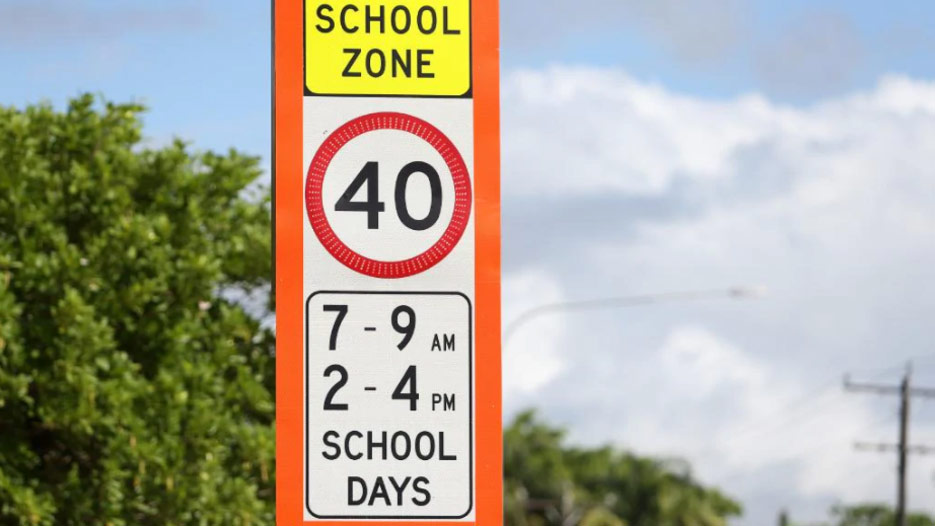World-first speed camera trial to protect students and roadworkers
News
As a world-first covert speed camera trial was announced for Queensland’s school zones and roadworks, RACQ has warned drivers to take speed limits seriously or they risked not only fines but children’s and roadworker’s lives.

The Queensland Government revealed the two year covert camera trial would roll out by the end of the year and include two roadworks sites and 24 high risk schools across the State.
RACQ spokesperson Renee Smith said the Club welcomed the trial as school zones and roadworks were often busy with many vulnerable pedestrians moving around close the road.
“Children can be unpredictable and often don’t have the same spatial awareness as adults, so while they’re still learning to be safe around cars it’s up to motorists to slow down and be alert to protect them,” Ms Smith said.
“Drivers should know by now a 40 kilometre per hour limit applies to school zones between 7-9am and 2-4pm on school days unless otherwise signed.
“Our research shows half of drivers have accidently sped through school zones so we’re asking everyone to pay close attention while behind the wheel and slow down and keep a close eye out for little ones, because not realising you’re speeding is no excuse.
“Parents can also keep their children safe by modelling good behaviour like crossing at designated locations and having their children exit the car through the left side door so they’re never getting out into traffic.”
Ms Smith said the two roadworks sites, which would have four cameras installed throughout the trial, would also include the addition of high visibility speed signage.
“With the new signs in place there should be no confusion for motorists about what speed they’re permitted to go,” she said.
“Roadworkers have families and friends to come home to and going too fast though their workplaces puts their lives at risk.
“While delays at roadworks can be frustrating, ultimately, these works are underway to make our roads safer. Even if there are no workers visible, lower speed limits help motorists safely navigate the changed road conditions which might not be immediately obvious.”
As the trial would use existing cameras already approved under enforcement legislation, Ms Smith warned drivers fines would apply to rule-breakers.
“If you’re caught by these cameras during the trial period you’ll be fined, but if you crash, a fine is the least of your worries,” she said.
“You’ll be able to see flashing lights, speed limit information and school zone and road works signage so it’s up to drivers to stay alert.
“Imagine the horror of hurting a child, teacher or roadworker because you were either not paying attention to the speed limit or couldn’t be bothered to slow down.”
RACQ spokesperson Renee Smith said the Club welcomed the trial as school zones and roadworks were often busy with many vulnerable pedestrians moving around close the road.
“Children can be unpredictable and often don’t have the same spatial awareness as adults, so while they’re still learning to be safe around cars it’s up to motorists to slow down and be alert to protect them,” Ms Smith said.
“Drivers should know by now a 40 kilometre per hour limit applies to school zones between 7-9am and 2-4pm on school days unless otherwise signed.
“Our research shows half of drivers have accidently sped through school zones so we’re asking everyone to pay close attention while behind the wheel and slow down and keep a close eye out for little ones, because not realising you’re speeding is no excuse.
“Parents can also keep their children safe by modelling good behaviour like crossing at designated locations and having their children exit the car through the left side door so they’re never getting out into traffic.”
Ms Smith said the two roadworks sites, which would have four cameras installed throughout the trial, would also include the addition of high visibility speed signage.
“With the new signs in place there should be no confusion for motorists about what speed they’re permitted to go,” she said.
“Roadworkers have families and friends to come home to and going too fast though their workplaces puts their lives at risk.
“While delays at roadworks can be frustrating, ultimately, these works are underway to make our roads safer. Even if there are no workers visible, lower speed limits help motorists safely navigate the changed road conditions which might not be immediately obvious.”
As the trial would use existing cameras already approved under enforcement legislation, Ms Smith warned drivers fines would apply to rule-breakers.
“If you’re caught by these cameras during the trial period you’ll be fined, but if you crash, a fine is the least of your worries,” she said.
“You’ll be able to see flashing lights, speed limit information and school zone and road works signage so it’s up to drivers to stay alert.
“Imagine the horror of hurting a child, teacher or roadworker because you were either not paying attention to the speed limit or couldn’t be bothered to slow down.”
Related topics
Things to note
The information in this article has been prepared for general information purposes only and is not intended as legal advice or specific advice to any particular person. Any advice contained in the document is general advice, not intended as legal advice or professional advice and does not take into account any person’s particular circumstances. Before acting on anything based on this advice you should consider its appropriateness to you, having regard to your objectives and needs.